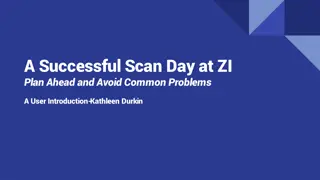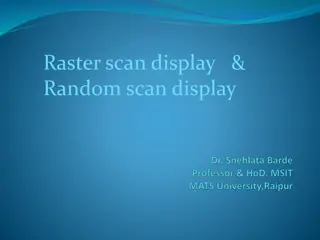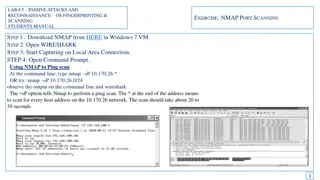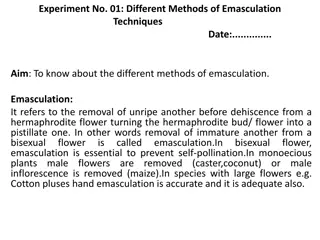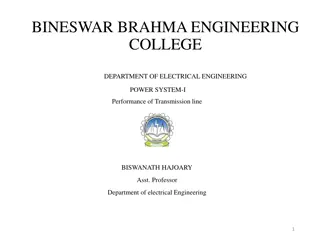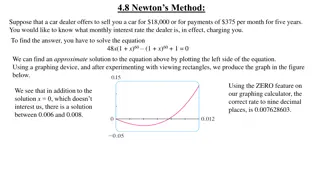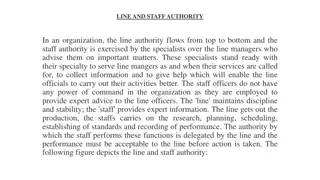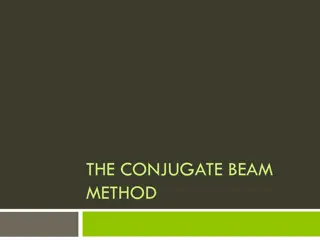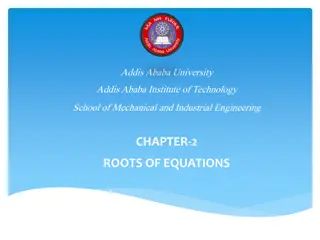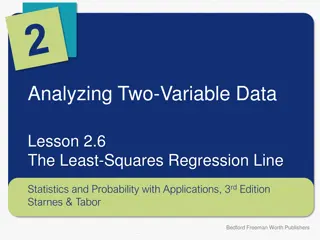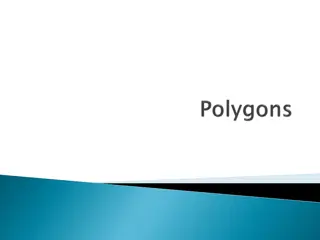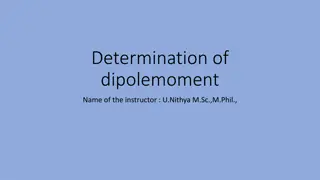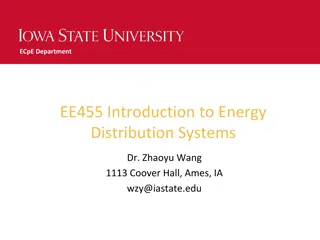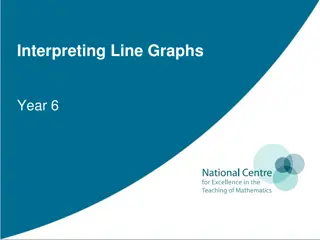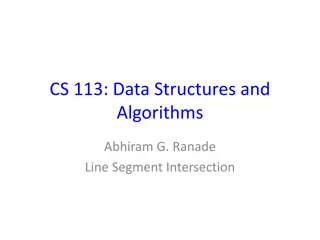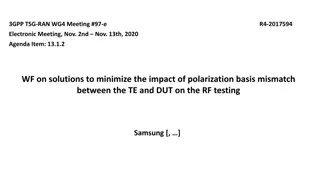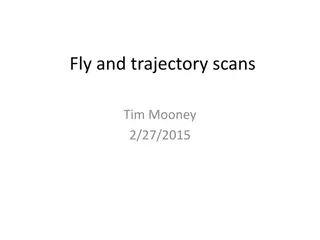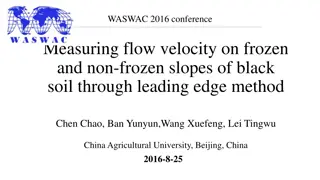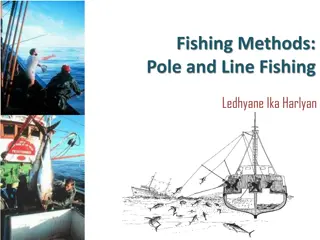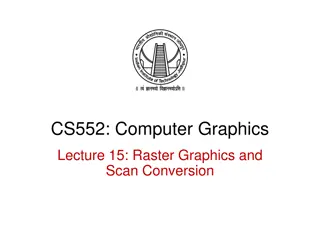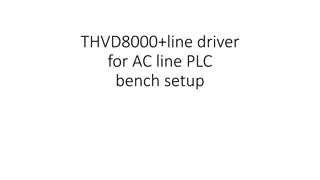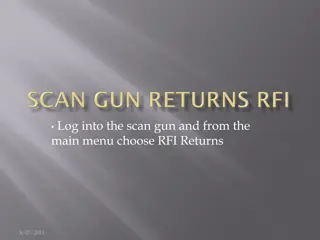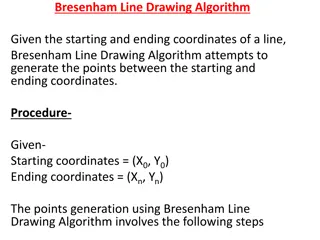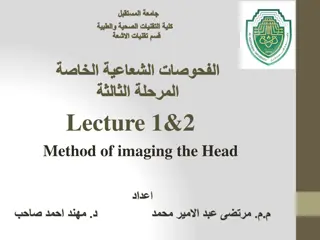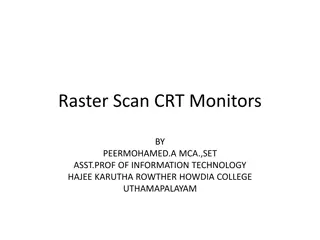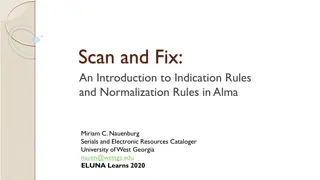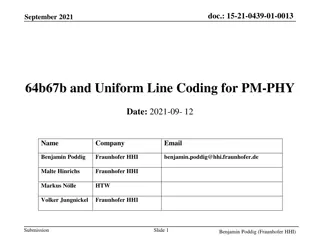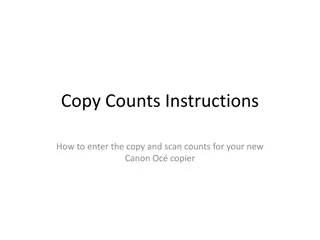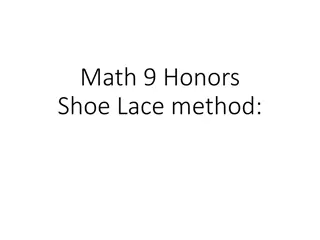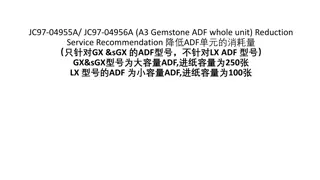Language Teaching Techniques: GTM, Direct Method & Audio-Lingual Method
Explore the Grammar-Translation Method, Direct Method, and Audio-Lingual Method in language teaching. Understand principles, objectives, and methodologies with insights into language learning approaches. Enhance teaching skills and foster effective communication in language education.
3 views • 82 slides
Successful Strategies for a Smooth MRI Scan Day at ZI
Plan ahead and avoid common problems for a successful MRI scan day at ZI with tips on study setup, participant preparation, scheduling, reservation time management, and packing essentials. Ensure a smooth process by having the right team in place and following key steps outlined in this comprehensiv
0 views • 18 slides
Line Segment Intersection
Geometric intersections play a crucial role in computational geometry for tasks such as solid modeling, collision detection in robotics, and overlaying subdivisions in geographic information systems. The problem of line segment intersection involves finding all intersection points between a set of c
0 views • 17 slides
Radiological Investigation of Hepatobiliary System and Imaging Modalities Overview
Exploring the hepatobiliary system through radiology, this lecture covers the anatomy, modalities like X-ray, Ultrasound, CT scan, MRI, and nuclear scan used for imaging, their advantages, disadvantages, and indications. It delves into the significance of liver, gallbladder, and biliary duct imaging
2 views • 37 slides
Understanding Line Sweep Algorithms in Geometry
Line sweep algorithms are a powerful tool for solving geometry problems by simulating the sweeping of a vertical line across a plane. This approach allows for efficient processing of important points and addressing various geometric challenges, such as finding the closest pair of points, determining
2 views • 10 slides
Insights from AHA Health Care Talent Scan for Thriving Workforce Planning
The AHA Health Care Talent Scan provides an annual overview of health care employment trends and expert recommendations for recruiting, training, and retaining health care workers. It addresses challenges in workforce planning, including clinician well-being, evolving education and training needs, a
0 views • 7 slides
Understanding Raster Scan Display and Random Scan Display Techniques
Raster scan display involves the electron beam moving along the screen in a systematic pattern to create an image, while random scan display directly draws pictures in any order. Raster scan is commonly used in devices like TVs and monitors, providing high color accuracy but may have lower resolutio
0 views • 9 slides
Passive Attacks and Reconnaissance using NMAP for Network Scanning
Learn how to use NMAP for passive attacks and reconnaissance through port scanning techniques like ping scan, TCP port scan, and stealth scan. Understand how to analyze the output in Wireshark to identify open ports and version numbers on target systems.
2 views • 7 slides
Understanding Different Emasculation Techniques in Plant Breeding
Learn about the significance of emasculation in plant breeding to prevent self-pollination and facilitate controlled pollination. Explore various methods such as hand emasculation, forced open method, clipping method, emasculation with hot/cold water, alcohol, suction method, chemical emasculation,
2 views • 10 slides
Understanding Performance of Transmission Lines in Electrical Engineering
The performance of a transmission line in power systems is critical for efficient operation. Factors such as voltage drop, line losses, and transmission efficiency are key considerations in design and operation. The line parameters of resistance, inductance, capacitance, and shunt conductance play c
2 views • 26 slides
Visualizing Real Numbers on a Number Line by Successive Magnification
Visualization techniques for representing real numbers on a number line through successive magnification are demonstrated step by step. The procedure involves dividing the line into equal parts and zooming in on specific ranges to accurately locate decimal values. This method helps in understanding
0 views • 12 slides
Understanding Newton's Method for Solving Equations
Newton's Method, also known as the Newton-Raphson method, is a powerful tool for approximating roots of equations. By iteratively improving initial guesses using tangent lines, this method converges towards accurate solutions. This method plays a crucial role in modern calculators and computers for
0 views • 12 slides
Understanding Line and Staff Authority in Organizational Structure
Line authority flows from top to bottom in an organization, while staff authority is provided by specialists to advise line managers. Staff members offer expert advice and support to enhance the efficiency of line officials. Different types of staff positions exist, such as personal staff, specializ
0 views • 5 slides
Understanding the Conjugate Beam Method in Structural Analysis
The Conjugate Beam Method is a powerful technique in structural engineering, derived from moment-area theorems and statical procedures. By applying an equivalent load magnitude to the beam, the method allows for the analysis of deflections and rotations in a more straightforward manner. This article
1 views • 11 slides
Understanding Roots of Equations in Engineering: Methods and Techniques
Roots of equations are values of x where f(x) = 0. This chapter explores various techniques to find roots, such as graphical methods, bisection method, false position method, fixed-point iteration, Newton-Raphson method, and secant method. Graphical techniques provide rough estimates, while numerica
0 views • 13 slides
Understanding Least-Squares Regression Line in Statistics
The concept of the least-squares regression line is crucial in statistics for predicting values based on two-variable data. This regression line minimizes the sum of squared residuals, aiming to make predicted values as close as possible to actual values. By calculating the regression line using tec
0 views • 15 slides
Filling Polygons Using Scan Line Algorithm
Learn how to fill polygons using the Scan Line Algorithm, which involves intersecting scan lines with polygon edges and filling the area between intersections. Steps include finding Ymin and Ymax, intersecting scan lines with edges, sorting intersection points, and filling the interior of the polygo
0 views • 36 slides
Detecting Eye Diseases Early with OCT Eye Scan
Take care of both your vision and health with an OCT eye scan, which can detect diseases like Diabetes, Glaucoma, and Age-Related Macular Degeneration. Learn how this simple procedure works and why it's important to prioritize your eye health. Say yes to the OCT health check for your extraordinary e
0 views • 13 slides
Determination of Dipole Moment in Chemistry
The determination of dipole moment in chemistry involves methods such as the Temperature Method (Vapour Density Method) and Refractivity Method. These methods rely on measuring various parameters like dielectric constants and polarizations at different temperatures to calculate the dipole moment of
1 views • 15 slides
Understanding Energy Distribution System Line Models
This presentation delves into the various line models used in energy distribution systems, including exact line segment models and their derivation from Kirchhoff's voltage and current laws. The discussion covers three line segment models, the computation of phase impedance and admittance matrices,
0 views • 44 slides
Understanding Line Graphs: Year 6 Lesson Overview
This document provides an introduction to interpreting line graphs for Year 6 students. It covers key concepts, reviews essential skills, explores precise mathematical vocabulary, and includes lesson clips on right angles and perpendicular lines. The journey through the lesson involves a focus on pe
0 views • 26 slides
Efficient Line Segment Intersection Algorithm
This content discusses the Line Segment Intersection problem and presents an efficient algorithm using the line sweep technique. The algorithm utilizes ordered sets implemented as balanced search trees to efficiently determine if any two line segments intersect in the plane. By sorting endpoints and
0 views • 10 slides
Solutions to Minimize Polarization Basis Mismatch Impact in RF Testing
The agenda item discusses proposals to reduce the impact of polarization basis mismatch between the test equipment and device under test during RF testing in the 3GPP TSG-RAN-WG4 meeting. Various methods, such as the TPMI side condition method and DL polarization scan method, are being considered to
0 views • 10 slides
Overview of Fly and Trajectory Scans in Data Acquisition
Fly and trajectory scans in data acquisition involve software and hardware options for acquiring data while positioners move at constant speeds. Software fly scans enable periodic data acquisition triggered by software, while hardware fly scans rely on pulses from positioners. Hardware fly choices a
0 views • 14 slides
Measurement of Flow Velocity on Frozen and Non-Frozen Slopes of Black Soil Using Leading Edge Method
This study presented a detailed methodology for measuring flow velocity on frozen and non-frozen slopes of black soil, focusing on the Leading Edge method. The significance of shallow water flow velocity in soil erosion processes was emphasized. Various methods for measuring flow velocity were compa
0 views • 23 slides
Step-by-Step Guide for Processing Returns Using a Scan Gun
Learn how to process returns efficiently using a scan gun by following a detailed step-by-step guide. From logging in to adding return lines, deleting entries, and handling trackable items, this guide provides clear instructions alongside visuals for a smooth return process.
0 views • 10 slides
Understanding Pole and Line Fishing Methods and Gear
Pole and line fishing is a traditional method involving a hooked line attached to a pole. This technique is commonly used for both sport fishing and commercial fisheries. Learn about the gear types, target species, vessel types, and auxiliary equipment used in pole and line fishing. Discover the spe
0 views • 10 slides
Raster Graphics and Scan Conversion in Computer Graphics
This lecture covers various topics related to raster graphics and scan conversion in computer graphics. It includes issues with scan converting a line, generalized line drawing algorithms, and the midpoint circle drawing algorithm. Additionally, it explores deriving mathematical expressions for draw
0 views • 21 slides
THVD8000 Line Driver for AC Line PLC Bench Setup
Explore the setup of THVD8000 line driver for AC line PLC, including transmitting and receiving paths, signal flow, power distribution, and components involved. Follow the signal path from THVD8000EVM to AFE031 boostpack, transformer, HV capacitor, and UCC28880EVM. Understand the power flow from AC
0 views • 11 slides
Guide to Processing RFI Returns on the Scan Gun Menu
Learn how to efficiently process RFI Returns using the scan gun menu. Follow step-by-step instructions, including entering incident details, adding return lines, handling mistakes, and completing the return process seamlessly. Images accompany each step for visual guidance.
0 views • 19 slides
Bresenham Line Drawing Algorithm Explained with Examples
Bresenham Line Drawing Algorithm is a method used to generate points between starting and ending coordinates to draw lines efficiently. This algorithm involves calculating parameters, decision parameters, and iteratively finding points along the line. Two example problems are provided with step-by-s
0 views • 8 slides
Methods of Imaging the Brain: X-ray, CT Scan, and MRI
Different methods of imaging the brain, including X-ray, CT scan, and MRI, offer non-invasive ways to study brain structure and function. X-rays measure tissue density, CT scans provide detailed cross-sectional images, and MRI produces 3D anatomical images. MRI, in particular, has become a vital too
0 views • 37 slides
Understanding Raster Scan CRT Monitors in Information Technology
Raster Scan CRT Monitors are a common graphical output device used in Information Technology. They consist of components like the electron gun, control electrodes, and phosphor-coated screen. The electron beam emitted uses electromagnetic fields to direct and focus on specific spots on the screen. T
0 views • 11 slides
Solutions to Minimize Polarization Basis Mismatch Impact in RF Testing
In the 3GPP TSG-RAN-WG4 Meeting #97-e, discussions focused on minimizing the impact of polarization basis mismatch between the TE and DUT in RF testing for Samsung devices. Various proposals were presented relating to EIRP measurement and methods to enhance testing procedures. Key topics included TP
0 views • 10 slides
Scan and Fix: Indication and Normalization Rules in Alma
Introduction to indication rules and normalization rules in Alma Miriam C. Nauenburg's presentation on the scan and fix workflow. Learn about creating and applying indication and normalization rules, testing rules in the Metadata Editor, and organizing rules as private or shared.
0 views • 54 slides
Optimizing Line Coding for PM-PHY: A Detailed Analysis
Enabling line coding and channel equalization methods for PM-PHY, the IEEE 802.15.13 standard introduces overhead while enhancing channel adaptation. This contribution proposes 64b67b and Uniform Line Coding as alternative transmission modes, aiming to reduce line coding overhead while maintaining a
0 views • 26 slides
Overview of Cervical Cancer Screening Programs in Canada
The Canadian Partnership Against Cancer conducts an annual environmental scan on cervical cancer screening guidelines and strategies across the country. Organized screening programs are available in most provinces, offering services to asymptomatic women at average risk. This scan provides insights
1 views • 46 slides
Canon Oc Copier Copy and Scan Count Instructions
Follow these steps to enter the copy and scan counts for your new Canon Oc copier. Start by entering the copier serial number, then press the Counter Check button to view the current copy count. Next, check the Scan Count by totaling the black and white scans with color scans. Use the provided image
0 views • 6 slides
Understanding the Shoe Lace Method for Finding Polygon Areas
The Shoe Lace Method is a mathematical process used to determine the area of any polygon by employing coordinate geometry. By following specific steps, including organizing coordinates, multiplying diagonally, and adding columns in a certain manner, the method allows for a straightforward calculatio
0 views • 8 slides
ADF Scan/Copy Quality Issue Resolution Recommendation
The service recommendation provides troubleshooting steps to address ADF scan/copy quality issues on A3 Gemstone products. It advises testing scanning/printing, adjusting settings, cleaning components, and replacing parts if necessary for optimal performance.
0 views • 15 slides

